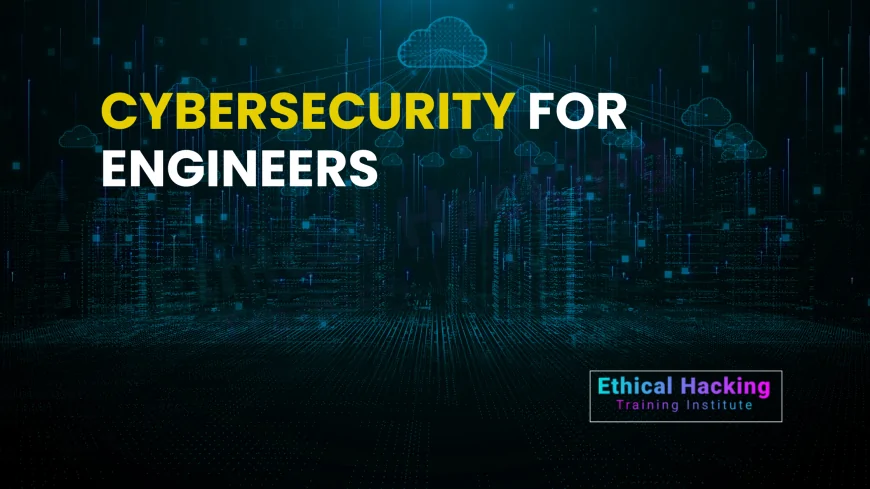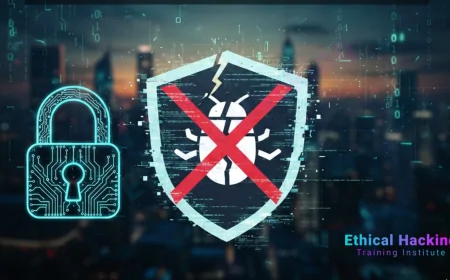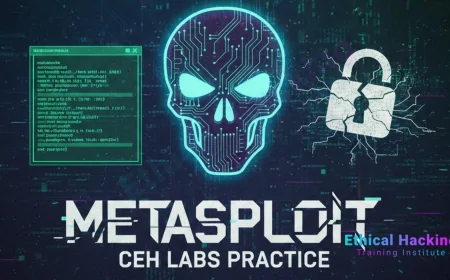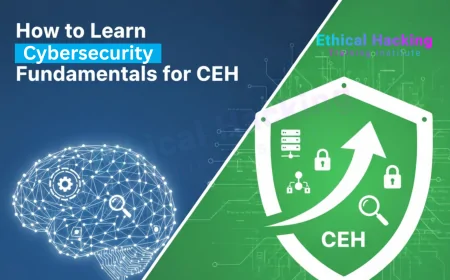Cyber Security for Engineering Students | Why Start Early?
Learn why engineering students should start early with cybersecurity training. Explore the benefits of cybersecurity skills for engineering students and how early exposure enhances career prospects.

Why Cybersecurity is Crucial for Engineering Students?
As engineering students, you are often exposed to a variety of technologies, software, and systems, all of which are vulnerable to cyber threats. Whether you’re working on embedded systems, cloud computing, or software development, a basic understanding of cybersecurity can protect both your personal data and the projects you work on.
Moreover, engineering students are prime candidates for the cybersecurity workforce, as they possess problem-solving skills, technical expertise, and analytical thinking. The sooner you start learning about cybersecurity, the more prepared you’ll be to handle these challenges and make a significant impact in the industry.
What Does Cybersecurity Entail for Engineering Students?
Cybersecurity is a broad field, encompassing various aspects of protecting systems, networks, and data from malicious attacks. For engineering students, understanding the core principles of cybersecurity is essential for building secure software, designing safe systems, and ensuring that the infrastructure you work with is resilient against cyber threats. Key areas of focus in cybersecurity include:
-
Network Security: Understanding how to protect network infrastructures, prevent unauthorized access, and mitigate risks associated with data transmission.
-
Cryptography: The science of protecting information through encryption techniques. Cryptography is vital for securing sensitive data both at rest and in transit.
-
Ethical Hacking: Also known as penetration testing, ethical hacking involves simulating cyberattacks to find vulnerabilities in systems and networks before malicious hackers can exploit them.
-
Incident Response and Disaster Recovery: Knowing how to respond effectively to security breaches and ensuring the recovery of systems and data in the event of an attack.
-
Risk Management and Compliance: Evaluating potential threats, identifying vulnerabilities, and adhering to industry standards and regulations to ensure that systems remain secure.
-
Cybersecurity Frameworks and Protocols: Familiarizing yourself with industry-standard frameworks like NIST, ISO 27001, and GDPR, which guide organizations in creating and maintaining secure systems.
The Importance of Starting Early in Cybersecurity
-
Stay Ahead of the Curve:
The field of cybersecurity is continuously evolving, with new threats and technologies emerging regularly. By starting early, you gain the ability to stay ahead of industry trends, such as the rise of Artificial Intelligence (AI) and machine learning in cyberattacks. A proactive approach gives you the time to master essential skills, making you more competitive in the job market upon graduation. -
Gain Practical Experience:
Cybersecurity is not just about theoretical knowledge – it requires hands-on experience. By starting your cybersecurity education during your engineering studies, you can gain exposure to real-world scenarios through internships, practical labs, and projects. Participating in cybersecurity competitions like Capture the Flag (CTF) also allows you to sharpen your skills and demonstrate your expertise to potential employers. -
Interdisciplinary Skills:
As an engineering student, you are already learning how to build and optimize systems. Cybersecurity knowledge adds an additional layer of expertise, allowing you to design and implement secure systems from the start. Whether you are in software engineering, computer science, or electrical engineering, understanding how to safeguard your creations from vulnerabilities will make you more valuable in the workforce. -
Expand Career Opportunities:
Cybersecurity professionals are in high demand across industries, and the need for engineers with cybersecurity skills is only growing. By starting early, you give yourself the opportunity to build a specialized skill set that can lead to roles such as cybersecurity analyst, penetration tester, security engineer, or even Chief Information Security Officer (CISO). -
Understanding the Risks:
With the increasing reliance on technology, the risk of cyberattacks is becoming more prevalent. Engineering students who start their cybersecurity journey early are better equipped to identify and address vulnerabilities in systems they may work on, ensuring that their projects remain secure. Understanding risks and implementing best practices for security can make a huge difference in protecting critical data and systems.
How Can Engineering Students Start Learning Cybersecurity?
-
Online Courses and Certifications:
Many online platforms, such as Coursera, Udemy, and edX, offer introductory and advanced cybersecurity courses tailored for engineering students. Some of these platforms also provide industry-recognized certifications like CompTIA Security+, Certified Ethical Hacker (CEH), and Certified Information Systems Security Professional (CISSP). -
Hands-on Labs and Simulations:
Practical experience is key in cybersecurity. Look for labs, virtual environments, and cybersecurity challenges (like CTF competitions) that allow you to practice your skills in real-world scenarios. Virtual environments like Hack The Box and TryHackMe offer practical exercises and challenges that will help you sharpen your hacking and penetration testing skills. -
Cybersecurity Internships:
Internships provide valuable hands-on experience and a closer look at how cybersecurity is applied in the real world. Many tech companies and cybersecurity firms offer internships for engineering students interested in learning more about security. -
Join Cybersecurity Communities:
There are several online communities and forums dedicated to cybersecurity where you can connect with professionals, share ideas, and learn from others. Websites like Reddit, StackExchange, and GitHub are great platforms to engage in discussions, share knowledge, and stay updated on the latest cybersecurity trends. -
University Courses:
Many engineering colleges and universities offer elective courses in cybersecurity. These courses may cover a wide range of topics from ethical hacking to network security. If your institution doesn’t offer these electives, consider seeking out extra-curricular programs or independent study options.
Key Cybersecurity Certifications Engineering Students Should Consider:
-
Certified Ethical Hacker (CEH): Learn the basics of ethical hacking, penetration testing, and network security.
-
CompTIA Security+: A foundational certification covering various aspects of cybersecurity, such as risk management, cryptography, and network security.
-
Certified Information Systems Security Professional (CISSP): Advanced certification for those looking to specialize in information security management.
-
Certified Information Security Manager (CISM): Focuses on governance, risk management, and security management.
Conclusion: Start Early for a Secure Future
As an engineering student, the field of cybersecurity offers numerous career opportunities that are both rewarding and vital in today’s digital age. By starting early, you can build a strong foundation, gain practical experience, and position yourself for success in a rapidly growing field. With cyber threats becoming more sophisticated, having cybersecurity skills will not only benefit your personal projects but will also enhance your employability and long-term career prospects.
The world is in need of cybersecurity professionals, and as an engineering student, you are perfectly poised to be a part of the solution. So, begin your cybersecurity journey today and start building a secure future.
FAQs:
What is Cybersecurity for Engineering Students?
Cybersecurity for engineering students involves learning how to protect computer systems, networks, and data from cyber threats. Engineering students are exposed to various technologies, making it essential to understand how to secure them.
Why should engineering students start learning cybersecurity early?
Starting early gives students a competitive edge by providing the foundational skills necessary for a career in cybersecurity, along with hands-on experience and a solid understanding of the latest technologies.
How can cybersecurity help engineering students in their future careers?
Cybersecurity is a growing field with high demand for skilled professionals. By gaining cybersecurity knowledge, engineering students can enhance their job prospects and contribute to protecting digital systems in various industries.
What are the key areas of cybersecurity that engineering students should focus on?
Key areas include network security, cryptography, ethical hacking, incident response, risk management, and cybersecurity frameworks and protocols.
Can engineering students pursue cybersecurity alongside their regular coursework?
Yes, engineering students can easily pursue cybersecurity alongside their regular coursework through online courses, certifications, and hands-on practice in labs or internships.
Are there any online courses for cybersecurity for engineering students?
Yes, platforms like Coursera, Udemy, edX, and Cybrary offer online cybersecurity courses designed for beginners and advanced learners alike.
What are the benefits of learning cybersecurity as an engineering student?
Learning cybersecurity helps protect projects and systems from security breaches and equips students with skills that are highly sought after in the job market.
What skills do engineering students gain by learning cybersecurity?
Students gain problem-solving skills, technical knowledge in securing systems, hands-on experience with ethical hacking, and proficiency in cybersecurity tools.
Is cybersecurity a good career option for engineering students?
Yes, cybersecurity offers excellent career prospects, with roles ranging from cybersecurity analyst to penetration tester and Chief Information Security Officer (CISO).
How do cybersecurity certifications help engineering students?
Certifications like CEH, CISSP, and CompTIA Security+ validate your skills and make you stand out to employers in the competitive cybersecurity job market.
How does cybersecurity relate to software engineering?
Software engineers can integrate security measures into the software development lifecycle, ensuring that applications are secure from the start.
What practical experience can engineering students gain in cybersecurity?
Students can engage in hands-on labs, CTF (Capture the Flag) competitions, internships, and virtual security environments to practice ethical hacking and other cybersecurity techniques.
What are some cybersecurity internships available for engineering students?
Many tech companies and cybersecurity firms offer internships where students can learn and gain real-world experience in securing systems and networks.
What cybersecurity tools should engineering students learn?
Students should familiarize themselves with tools like Kali Linux, Metasploit, Wireshark, Nmap, and Burp Suite, which are commonly used for ethical hacking and penetration testing.
Are there any universities offering cybersecurity as an elective for engineering students?
Yes, many engineering colleges offer electives in cybersecurity, especially in computer science and information technology departments.
How can engineering students start learning ethical hacking?
Students can start by taking online courses in ethical hacking, practicing with virtual labs, and participating in ethical hacking challenges and competitions.
What is ethical hacking, and why is it important for engineering students?
Ethical hacking involves testing systems for vulnerabilities to find and fix security gaps before malicious hackers exploit them. It is essential for engineering students to understand ethical hacking to ensure the security of their projects.
What is cryptography, and why is it important in cybersecurity?
Cryptography is the practice of securing data through encryption techniques. It is vital for protecting sensitive information in digital communication and storage.
How does risk management fit into cybersecurity for engineering students?
Risk management involves identifying potential cybersecurity threats, assessing their impact, and implementing strategies to mitigate risks. Engineering students learn how to design systems with security in mind to minimize these risks.
What are the career opportunities for engineering students in cybersecurity?
Engineering students can pursue roles such as cybersecurity analyst, penetration tester, network security engineer, information security consultant, and CISO.
What are the top cybersecurity certifications for engineering students?
Popular certifications include Certified Ethical Hacker (CEH), CompTIA Security+, CISSP, and Certified Information Security Manager (CISM).
How can engineering students stay updated with the latest cybersecurity trends?
Students can follow cybersecurity blogs, participate in online forums, attend webinars, and subscribe to industry newsletters to stay informed on the latest trends and threats.
What are Capture the Flag (CTF) competitions, and how can they help engineering students?
CTF competitions challenge participants to solve security-related puzzles and tasks. These competitions help students develop problem-solving and ethical hacking skills in a competitive environment.
What is network security, and why should engineering students learn it?
Network security involves securing a computer network from cyber threats. Engineering students must learn network security to protect data transmission and prevent unauthorized access to systems.
How does starting early with cybersecurity give engineering students a competitive edge?
Starting early allows students to acquire essential cybersecurity skills before entering the job market, making them more attractive to employers in the cybersecurity field.
Are there any cybersecurity challenges for engineering students?
Yes, students can participate in CTF competitions, hacking challenges, and online platforms like Hack The Box and TryHackMe to hone their skills.
How do cybersecurity frameworks like NIST and ISO 27001 help engineering students?
These frameworks provide best practices and guidelines for designing and managing secure systems. Engineering students learn how to implement security measures according to these frameworks.
What is the role of cybersecurity in cloud computing for engineering students?
As cloud computing becomes more widespread, understanding cloud security is crucial for engineering students. They learn how to protect cloud infrastructure and data from breaches.
Can cybersecurity skills help engineers in IoT (Internet of Things)?
Yes, cybersecurity is critical for securing IoT devices, as these devices often collect sensitive data and are prone to cyberattacks. Engineering students can learn how to safeguard IoT systems from vulnerabilities.
What are the best resources for engineering students to learn cybersecurity?
Top resources include online courses, certification programs, cybersecurity books, blogs, and hands-on labs.
Why is incident response an important part of cybersecurity for engineering students?
Incident response involves detecting, responding to, and recovering from cybersecurity incidents. Engineering students should learn these techniques to help mitigate the impact of security breaches.
Can engineering students study cybersecurity through boot camps?
Yes, many cybersecurity boot camps are designed for engineering students, offering intensive, hands-on training in a short period of time.
What's Your Reaction?
 Like
0
Like
0
 Dislike
0
Dislike
0
 Love
0
Love
0
 Funny
0
Funny
0
 Angry
0
Angry
0
 Sad
0
Sad
0
 Wow
0
Wow
0

















